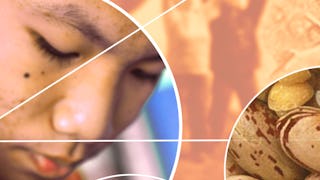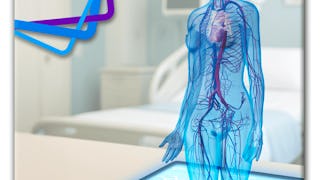This course addresses the global rise in cardiometabolic diseases (CMDs) like diabetes, hypertension, and high cholesterol, especially in low- and middle-income countries. CMDs require long-term, personalized care, placing a heavy burden on individuals, families, and healthcare systems. The course explores how healthcare personnel can support lifelong treatment in resource-limited settings and develop healthcare models for underserved populations.

Early bird sale! Unlock 10,000+ courses from Google, Microsoft, and more for £160/year. Save now.


Tackling cardiometabolic diseases – insights from India



Instructors: Vinod Joseph Abraham
Included with 
Recommended experience
Skills you'll gain
- Public Health
- Education and Training
- Care Management
- Healthcare Industry Knowledge
- Preventative Care
- Health Care
- Health Systems
- Chronic Diseases
- Community Health
- Health Disparities
- Health Equity
- Clinical Nutrition
- Public Health and Disease Prevention
- Patient Education And Counseling
- Medical Management
- Long Term Care
- Primary Care
- Nutrition and Diet
Details to know

Add to your LinkedIn profile
May 2025
5 assignments
See how employees at top companies are mastering in-demand skills

There are 4 modules in this course
In the first module, you will be introduced to the challenges of cardiometabolic diseases (CMDs) in India and other low- and middle-income countries. We will examine why the prevalence of these diseases is rising and the impact of this challenge on individuals, families, and healthcare systems. You will learn about the development of three central cardiometabolic conditions, diabetes, hypertension, and dyslipidemia (high cholesterol), how they are related, and the complications they can lead to. You will also experience how the Christian Medical College Vellore provides healthcare to remote and underserved populations with the use of mobile clinics and close collaboration between local community health workers, nurses and doctors from the regional health centres.
What's included
6 videos7 readings2 assignments1 discussion prompt
People in India and many other low- and middle-income countries have a higher risk of developing cardiometabolic disease – even at a younger age and lower bodyweight compared to people of for example European descent. In this module we will focus on the specific risk factors for cardiometabolic disease in South and Southeast Asia. We will also focus on how screening for cardiometabolic diseases is done at CMC Vellore and the challenges related to screening.
What's included
2 videos3 readings1 assignment1 discussion prompt
Leading a healthy lifestyle is key to preventing and treating cardiometabolic diseases – no matter if people have a genetic predisposition for these conditions or not. In this module we will look at the various aspects of healthy living and also the barriers many people experience in their attempt to follow health guidelines and treatment plans.
What's included
6 videos6 readings1 assignment2 discussion prompts
Cardiometabolic diseases are chronic conditions that require continuous care with a focus on educating patients about their disease as well as supporting them in following the treatment plan. In this module we will focus on how to initiate care for a newly diagnosed patient and how to tackle the challenges related to continuity of care. We will see how multidisciplinary healthcare teams with local community health workers, nurses and doctors collaborate when providing education, support and treatment for patients. Finally, we will also look into the importance of informal support to cardiometabolic patients through a case study from Vietnam.
What's included
3 videos6 readings1 assignment1 discussion prompt
Earn a career certificate
Add this credential to your LinkedIn profile, resume, or CV. Share it on social media and in your performance review.
Explore more from Public Health

The University of Sydney
 Status: Free Trial
Status: Free TrialJohns Hopkins University

University of Copenhagen
 Status: Free Trial
Status: Free Trial
Why people choose Coursera for their career





Open new doors with Coursera Plus
Unlimited access to 10,000+ world-class courses, hands-on projects, and job-ready certificate programs - all included in your subscription
Advance your career with an online degree
Earn a degree from world-class universities - 100% online
Join over 3,400 global companies that choose Coursera for Business
Upskill your employees to excel in the digital economy
Frequently asked questions
Access to lectures and assignments depends on your type of enrollment. If you take a course in audit mode, you will be able to see most course materials for free. To access graded assignments and to earn a Certificate, you will need to purchase the Certificate experience, during or after your audit. If you don't see the audit option:
The course may not offer an audit option. You can try a Free Trial instead, or apply for Financial Aid.
The course may offer 'Full Course, No Certificate' instead. This option lets you see all course materials, submit required assessments, and get a final grade. This also means that you will not be able to purchase a Certificate experience.
When you purchase a Certificate you get access to all course materials, including graded assignments. Upon completing the course, your electronic Certificate will be added to your Accomplishments page - from there, you can print your Certificate or add it to your LinkedIn profile. If you only want to read and view the course content, you can audit the course for free.
You will be eligible for a full refund until two weeks after your payment date, or (for courses that have just launched) until two weeks after the first session of the course begins, whichever is later. You cannot receive a refund once you’ve earned a Course Certificate, even if you complete the course within the two-week refund period. See our full refund policy.
More questions
Financial aid available,






